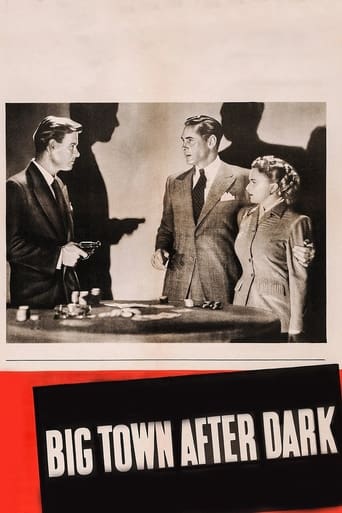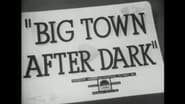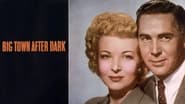dougdoepke
Pretty good little programmer. No one expects Oscar bait from Pine-Thomas's budget productions. Still, the cast appears motivated, while the script, though convoluted, has a couple good twists. I'm particularly impressed with an animated Reed who too often delivered wooden performances, but not here. Seems he's playing editor of a city newspaper that's trying to take down the town's gambling casinos. At the same time he's working to keep his staff together while trying to accommodate the boss's ambitious daughter. But things aren't always as they seem, as he eventually finds out. Kudos to director Thomas—half of the Pine-Thomas producing team—who shows skill at directing. I wouldn't be surprised if his presence behind the camera had a lot to do with motivating the cast. My only gripe is with the under-use of the great Hillary Brooke. Her regal presence always adds to movie proceedings. Here, however, she doesn't have much to do after the opening scene.Anyway, nothing memorable here, just a good little time-passer based on a popular radio program of the time.
kidboots
Ann Gillis was one of the many child actors who the studios thought would be another Shirley Temple. It didn't happen - there was only one Shirley and besides Ann wasn't really given much of a chance. Mostly her roles were uncredited bits but she came through as Becky Thatcher in "The Adventures of Tom Sawyer" (1938). She was just marvellous in it and was definitely the Becky that everyone remembers - especially in the "cave" scene. Unfortunately, after being mean to Gloria Jean in "The Underpup" (1939) it was back to bit parts and worse. "Big Town After Dark" (based on a popular radio series), the last film she made before her retirement at 20, may have given her her meatiest role since Becky.Lorelei Kilbourne, aka "Goldilocks" (Hilary Brooke) a reporter for the Illustrated Press, is handing in her notice - she has just had her first novel published and has another one in the works. The boss of the paper has a niece, Susan Peabody (Ann Gillis) who is just raring to get into the newspaper business and she is instantly given Goldie's old job as a crime reporter.She is not the innocent she makes out - she cleans out the office in a poker game and admits she learned how to play in the Winner's Club in Big Town. She is all for cleaning up the rackets and convinces the Editor, Wilson (Philip Reed) to run a crusade against them in his paper. With a couple of shady characters following her around, it looks as though she has connections to the local crime boss. (Just how close you find out in the last 10 minutes). When Wilson escorts her to the club, he gets into a fight, after accusing a woman of dealing from the bottom of the deck. Then Susan disappears - Wilson and Lorelei fear a kidnapping. Susan's father is then contacted to pay a ransom. Next thing Susan saunters in with a story of a stolen car and then having to spend the night at her girlfriends. A lot of things don't add up but Goldie and her pal Louie (Vince Barnett) are the only ones who are suspicious. "You're carrying a torch for that guy like the Statue of Liberty"!!! "Goldilocks" does some investigating on her own and finds out that Susan never worked for the Mercury as she claimed she did!!!Ann Gillis, looking just the same as in her Becky Thatcher days - only with an upswept hairdo, plays the petulant Susan petulantly. Obviously, Becky Thatcher was the one great role she had in her. The film could have done with a lot more of the beautiful and elegant Hilary Brooke, who just didn't have enough to do.Recommended.
sol1218
**SPOILERS** A big smash with her first crime novel the Illustrated Press' ace police reporter Lorelei, who's knows as "Goldie Locks" to her friends, Kilbourne (Hillary Brooks) decides to quit her job at the newspaper and become a full time crime writer. Upset that his star reporter, as well as girlfriend, is leaving managing editor Steve Wilson, Phillip Reed, persuades Lorelei to stay for two more weeks until he finds a suitable replacement for her. In no time at all Wilson is contacted by the newspapers owner Amos Peabody, Charles Arnt, with the proposition of having his 20 year-old niece Susan, Ann Gillis, replace Lorelie.Susan being, by Uncle Amos, put through collage and journalism school is anything but interested in getting a scoop or story for her uncle's newspaper. While her naive Uncle Amos is paying the bills, for her collage car and rent, Susan is partying the night away and getting involved with a number of very shady characters in town most of whom she met, while gambling, at the notorious "Winners Club". Wilson who had since ditched the classy and on the ball Lorelei has been getting romantically involved with Susan who unknown to the love-sick managing editor is taking him to the cleaners and taking him there big time.Through Susan Wilson gets involved with a number of dangerous hoodlums notably the owner of the "Winners Club" Chuck LaRue, Richard Travis, that leads to Susan being disappeared, or kidnapped, by LaRue and held for a $50,000.00 ransom. LaRue is so slick and slippery that he has Susan's Uncle Amos pay him the $50,000.00 for her release by making it look like it's a legitimate stock transaction without Susan's name never being even mentioned!****SPOILER ALERTS****It soon becomes apparent that the sweet and innocent Susan is anything but a crime victim in that she was never kidnapped, by LeRue or anyone else. In fact Susan was laying low while everyone the police Uncle Amos Steve Wilson, as well as the reporter that she replaced Lorelie Kilbourne, where out desperately looking for her. Wilson who got worked over by LaRue and his hoods at the "Winners Club" earlier is now determined to run him out of the state together his sleazy gambling operation that's cheats it's customers out of their hard earned cash.With Amos Peabody, who's very close and friendly with the governor, pushing for the state legislators to pass a bill to put LaRue out of commission LaRue has a "Trojan Horse" placed in his, and the Illustrated Press', home. This spy and traitor is giving LaRue all the inside information on what Amos Peabody is up to and at the same time, this without LaRue's knowledge, screwing him behind his back as well.Wilson finally seeing the light, in what a sucker he was up until then, gets to have himself involved with the LaRue gang by putting his life on the line and forcing LaRue's hand in attempting to murder him. This all played into LaRue's master plan to off not only Wilson but Susan, who it turned out was a lot closer to LaRue then we at first thought, and her secret boyfriend LaRue hood Jake Sabastian, Robert Kent. In the end, when all the dust cleared, Lorelie realized what a mistake she made in quiting her job at the Illustrated Press. It was Lorelie's decision to go solo, as a crime writer, that opened the door to all the damage and destruction that happened with the advent of Susan Peabody suddenly coming on the scene. Wilson also realized what a first class jerk he was by throwing the sincere honest and beautiful Lorelie overboard for the childish sneaky and unstable Susan. Steve Wilson should thank his lucky stars that he not only survived the mess that he put himself into but that Lorelie came back into his life as well as his newspaper.
rsoonsa
"Big Town", a shallowly disguised New York City, is of importance in a number of modes for popular United States culture, initially being a radio programme from 1937 until 1962, then on to television episodes, 1952/1956, and eventually as a comic book series, 1956/1958, with the protagonist in each manifestation being Steve Wilson, originally a reporter working for the Big Town Illustrated Press, later becoming its editor-in-chief, and played in this, the third of four films based upon the radio show, by Philip Reed who is featured in all of the four. In the production here, Wilson's almost girl friend and ace crime reporter Lorelei Kilbourne (Hillary Brooke), after her first novel has been accepted for publication, gives him two weeks notice of her resignation from her newspaper position but, to her chagrin, she is almost immediately replaced by the Illustrated Press owner's niece Susan (Anne Gillis), who by appearances also wedges herself into Steve's affections, although in reality he is using her to discover information of crooked Big Town activity involving an illegal gambling ring that preys upon college students. Susan is possibly not what she appears to be, and while Steve explores the girl's connection with local gambling kingpin Chuck LaRue (Richard Travis), owner of the Winners' Club, a night spot for gambling that is near to the campus where Susan attends, Lorelei also investigates her new rival's activities, with her efforts yielding more than she has expected, as all three of them may be in serious peril from the Forces of Evil. This is better than a routine "B" programmer, as it provides some incisive and hard bitten dialogue, a clever subtext based upon poker playing, and a generally edgy quality pervading the characterizations that lifts the work above the norm and, in spite of budget restrictions that rule out retakes, and a necessity for filling demands of its melodrama genre, there is plenty of "business" for a viewer to enjoy. Reed and Brooke make an elegant and worldly pair, veteran character players William Haade and Joe Sawyer perform as LaRue henchmen, and Vince Barnett has a substantial part in this Pine/Thomas production with producer William Thomas also directing and capably utilizing a crisply composed Whitman Chambers script in an always interesting, skillfully edited, briskly paced and well-cast film that additionally includes an effective original score by Darrell Calker, Gotham flavoured, of course, although the extensive location shooting is along Normandie Avenue on the east side of Hollywood.





